
Annals of Anthropological Practice
Scope & Guideline
Bridging the Gap Between Research and Real-World Application
Introduction
Aims and Scopes
- Applied Ethnography:
The journal focuses on the application of ethnographic methods to understand and address societal issues, including public health, education, and community resilience. - Interdisciplinary Approaches:
It encourages interdisciplinary research that incorporates insights from various fields, promoting innovative solutions to complex problems. - Ethical Considerations:
The journal emphasizes the importance of ethics in anthropological practice, particularly in sensitive contexts such as immigration, health interventions, and community engagement. - Educational Insights:
There is a strong focus on the educational aspect of anthropology, exploring how anthropology can be integrated into curricula and the implications for student career readiness. - Community Engagement:
The journal highlights research that fosters community collaboration and participation, ensuring that anthropological work is relevant and beneficial to the populations studied.
Trending and Emerging
- Public Health Interventions:
There is a notable increase in studies that examine the role of anthropologists in public health, especially in response to crises such as the COVID-19 pandemic, highlighting the impact of ethnographic research on health policies. - Participatory and Action Research:
Emerging themes include participatory action research methodologies that engage communities in the research process, fostering collaboration and empowerment. - Ethical and Social Justice Issues:
There is a growing emphasis on ethical considerations and social justice within anthropological practice, particularly in contexts involving marginalized communities and immigration. - Technological Integration in Research:
The incorporation of technology, such as drones and digital tools in ethnographic research, is increasingly prevalent, reflecting changes in how anthropologists gather and analyze data. - Education and Career Readiness:
Research focusing on the educational pathways for anthropology students and their career readiness is trending, indicating a commitment to preparing future anthropologists for professional roles.
Declining or Waning
- Traditional Anthropological Methods:
There seems to be a decline in papers focused solely on traditional anthropological methods without integration into contemporary issues, as the field moves towards more hybrid methodologies. - Abstract Theoretical Discussions:
Papers that revolve around abstract theoretical discussions without practical application are becoming less prominent, indicating a shift towards more hands-on, actionable research. - Historical Analyses:
Research focusing solely on historical analyses of anthropological practices or events is less frequently published, as current and applied contexts take precedence.
Similar Journals
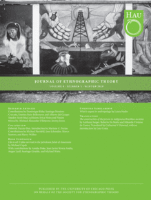
HAU-Journal of Ethnographic Theory
Elevating Scholarly Dialogue in the Heart of Anthropology.HAU-Journal of Ethnographic Theory, published by University of Chicago Press, stands as a leading platform for scholarly discourse in the field of anthropology. Established in 2011, this esteemed journal focuses on ethnographic methodologies and theoretical advancements, offering a significant contribution to the understanding of human cultures and social practices. With an impressive Q2 ranking in anthropology and a strong placement in the 63rd percentile among peers in the Scopus rankings, HAU ensures high visibility and impact within the academic community. Although the journal currently does not offer open access, it is widely available for institutions, fostering a global dialogue among researchers, professionals, and students. As it converges its content towards 2024, HAU remains dedicated to publishing innovative research that challenges existing paradigms and encourages critical reflection, solidifying its importance in the continuous evolution of ethnographic theory.

Focaal-Journal of Global and Historical Anthropology
Pioneering Insights into Anthropological PracticesFocaal-Journal of Global and Historical Anthropology is an esteemed academic journal published by BERGHAHN JOURNALS, focusing on the intricacies of global and historical anthropology. With an impressive impact factor and positioned in the Q1 category of anthropology for 2023, this journal is recognized for its exceptional contributions to the field, ranking #121 out of 502 in the Social Sciences category on Scopus. Since its transition to Open Access in 2020, Focaal has made significant strides in democratizing academic knowledge, allowing broader accessibility for researchers, professionals, and students worldwide. The journal provides a platform for interdisciplinary dialogue and critical analysis, paving the way for innovative research and thought-provoking discussions. With a commitment to fostering a deeper understanding of anthropological practices and their global implications, Focaal is an essential resource for anyone engaged in contemporary anthropological studies.

ANTHROPOLOGICAL QUARTERLY
Pioneering Perspectives in Anthropology and BeyondANTHROPOLOGICAL QUARTERLY, published by the George Washington University Institute of Ethnographic Research, stands as a vital resource in the field of anthropology and broader arts and humanities studies. With an ISSN of 0003-5491 and an E-ISSN of 1534-1518, this esteemed journal has been contributing to academic discourse since its establishment in 1981. The journal holds a respected position in both the Q2 category for Anthropology and the Q2 category for Arts and Humanities (miscellaneous), demonstrating its impact and relevance, as evidenced by its rank of #152 out of 502 in the Social Sciences sector for anthropology and rank of #179 out of 552 in the Arts and Humanities field. Researchers, professionals, and students can rely on ANTHROPOLOGICAL QUARTERLY for rigorous peer-reviewed articles that push the boundaries of ethnographic research and anthropological theory, addressing contemporary issues with scholarly precision. The journal’s commitment to fostering critical analysis and interdisciplinary perspectives establishes it as an essential platform for advancing knowledge within its diverse and dynamic field.
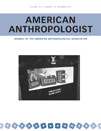
AMERICAN ANTHROPOLOGIST
Advancing anthropological discourse since 1888.American Anthropologist is a prestigious journal published by Wiley, dedicated to advancing the field of anthropology. With a rich publishing history dating back to 1888, it has become a leading platform for scholarly discourse, showcasing innovative research and diverse perspectives from around the globe. The journal holds impressive ranks within its categories, being recognized as Q1 in both Anthropology and Arts and Humanities, alongside a notable Scopus ranking of #36 out of 502 in Social Sciences. Its robust impact in academia is reflected in its emphasis on interdisciplinary approaches that resonate within the fields of social science and humanities. Researchers and students alike are encouraged to contribute to this vital resource that continues to shape anthropological thought and practice. For those interested, the journal is tailored for non-open access, ensuring the curation of high-caliber scholarly work accessible to a wide audience while supporting the standards of peer-reviewed publications.

Urbanities-Journal of Urban Ethnography
Transforming Urban Narratives Through EthnographyUrbanities - Journal of Urban Ethnography is a pivotal publication dedicated to the interdisciplinary field of urban anthropology. Published by the IUAES - Commission on Urban Anthropology in Italy, this journal serves as a platform for exploring the complexity of urban life through ethnographic methods, rigorously examining social practices, community dynamics, and cultural expressions within urban contexts. With its ISSN 2239-5725 and open access format, Urbanities promotes widespread dissemination of research findings, fostering academic discussions among researchers, professionals, and students alike. Over the years, it has secured a commendable standing in the academic community, evidenced by its Q2 ranking in Anthropology and Q3 in Urban Studies for 2023, along with respectable Scopus rankings. The journal's scope spans from 2015 to 2024, ensuring that it stays at the forefront of contemporary urban research. As a vital resource for anyone interested in the nuances of urban environments, Urbanities invites contributions that enrich our understanding of the urban experience and its myriad cultural dimensions.

Anthropologie et Sante-Revue Internationale Francophone d Anthropologie de la Sante
Pioneering Research for a Healthier TomorrowAnthropologie et Santé - Revue Internationale Francophone d'Anthropologie de la Santé is a pioneering platform in the field of medical anthropology, published by ASSOC AMADES, that has been at the forefront of research since its inception. With an ISSN of 2111-5028, this journal has maintained an Open Access model since 2010, ensuring that knowledge is disseminated freely to a global audience. Based in Aix-en-Provence, France, it offers a unique perspective on the intersections of culture, health, and society, catering specifically to researchers, professionals, and students interested in understanding the anthropological dimensions of health and healthcare practices across diverse populations. Although specific metrics like H-Index and Scopus ranks are currently unavailable, the journal's commitment to rigorous peer-review and its emphasis on multilingual contributions significantly enrich its academic relevance. By fostering interdisciplinary dialogue and showcasing innovative research, Anthropologie et Santé plays a critical role in shaping contemporary discussions around health anthropology and its global implications.
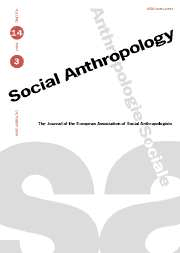
Social Anthropology
Navigating the Complexities of Social BehaviorSocial Anthropology is a leading journal published by BERGHAHN JOURNALS, focusing on the diverse and dynamic field of anthropology. With an ISSN of 0964-0282 and an E-ISSN of 1469-8676, this open-access journal has been a cornerstone of scholarly communication since its inception in 1982, becoming fully accessible to the public since 2022. Situated in the United States, the journal aims to disseminate high-quality research that explores sociocultural dimensions of human behavior across various contexts, addressing pressing contemporary issues through a multidisciplinary lens. With impressive rankings, including Q2 in Anthropology and Arts and Humanities, and strong positions in Sociology and Developmental Psychology according to Scopus metrics, Social Anthropology serves as an essential platform for researchers, professionals, and students committed to advancing our understanding of social practices and cultural norms. Its commitment to fostering intellectual discourse makes it a vital resource for those seeking to deepen their knowledge and insight into the anthropological landscape.
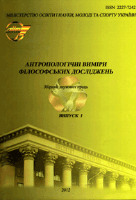
Anthropological Measurements of Philosophical Research
Bridging Cultures and Concepts in ResearchAnthropological Measurements of Philosophical Research is a distinguished open-access journal published by the ACAD V LAZARYAN DNIPROPETROVSK NATL RAILWAY TRANSPORT UNIV, dedicated to advancing interdisciplinary scholarship at the intersection of anthropology and philosophy. Since its inception in 2012, this journal has provided an invaluable platform for researchers, professionals, and students to disseminate innovative ideas and research findings, thereby fostering a deeper understanding of anthropological principles applied to philosophical inquiries. The journal encourages submissions that explore theoretical frameworks, longitudinal studies, and methodological advancements within this complex field. With a commitment to accessibility, it operates under an open access model, facilitating wider dissemination and engagement with its content. Situated in Dnipro, Ukraine, this journal aspires to contribute significantly to global discourses on cultural and philosophical dimensions of human experience, making it essential reading for anyone interested in these critical areas of study. Scholars focused on developing multidisciplinary approaches will find Anthropological Measurements of Philosophical Research an indispensable resource in their academic pursuits.
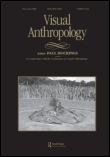
Visual Anthropology
Innovating Anthropological Inquiry with Visual MediaVisual Anthropology is a distinguished journal published by Routledge Journals, Taylor & Francis Ltd in the United Kingdom. With an ISSN of 0894-9468 and E-ISSN 1545-5920, this journal focuses on the intersection of visual media and anthropological research, exploring the ways in which visual representations influence cultural practices and perceptions. Since its inception in 1987, Visual Anthropology has contributed significantly to the fields of Anthropology and Cultural Studies, earning a Q2 rank in both categories as of 2023. With a solid impact factor and strategic indexing, the journal maintains a vital place for scholars seeking to understand the visual dimensions of human behavior and societal structures. Although it operates under a traditional subscription model, its rigorous peer-review process ensures the dissemination of high-quality research. The journal invites researchers, professionals, and students alike to engage with cutting-edge studies that bridge visual culture and anthropological inquiry.
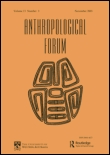
Anthropological Forum
Cultivating Scholarly Excellence Since 1963Anthropological Forum, an esteemed journal in the field of anthropology, is published by Routledge Journals, Taylor & Francis Ltd. With an ISSN of 0066-4677 and an E-ISSN of 1469-2902, the journal has cemented its reputation for fostering critical discussions and innovative research since its inception in 1963. Covering a broad range of topics within anthropology, it has achieved an impressive Q1 ranking in the category of Anthropology and a Q2 ranking in Arts and Humanities (miscellaneous) in 2023, showcasing its pivotal role in advancing scholarly discourse. With a Scopus ranking placing it in the top 10% of its field, the journal provides valuable insights into contemporary anthropological issues, making it an essential resource for researchers, professionals, and students alike. Although not an open-access journal, the comprehensive studies and articles published within its pages contribute significantly to the academic and professional community. Addressed out of Milton Park, Abingdon, UK, the Anthropological Forum remains a seminal platform for disseminating high-quality anthropological research.